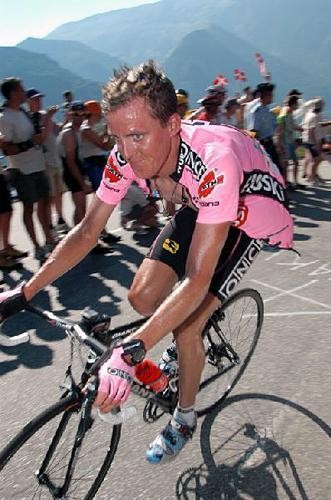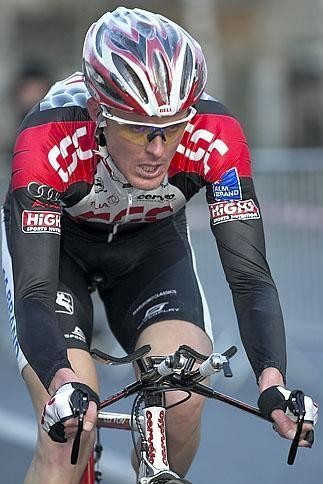Going places
On Saturday evening, the night before the opening prologue of Paris-Nice, Tour Méditerranéen winner...


An interview with Jörg Jaksche, March 6, 2004
On Saturday evening, the night before the opening prologue of Paris-Nice, Tour Méditerranéen winner Jörg Jaksche was sitting comfortably inside Team CSC's hotel, possibly running through the parcours of the 13.2 kilometres prologue in his mind before the big day. Cyclingnews' Chris Henry knew Jaksche was in with a good chance of winning the stage - but did both of them know he would in actual fact win the stage?
Jörg Jaksche is a modest man of 27 years, the kind of man who is unlikely to change even as he embarks on a new period in his career as a professional rider, a period where the victories are bound to be his and not just his team's. Jaksche is German, but spent much of his life growing up in Tirol, Austria, where he still lives. After turning professional in 1997 and spending two years with the Italian Polti team, he has since ridden two years with Deutsche Telekom and three with ONCE-Eroski before joining Bjarne Riis' Team CSC for 2004.
Jaksche spent the last three years under the wing of ONCE-Eroski director Manolo Saiz, becoming a fundamental part of the team's Tour de France roster, riding in support of Joseba Beloki. His mild demeanour and strong work ethic lend themselves well to riding selflessly for his team-mates, but make no mistake, Jaksche has ambitions of his own. Overall victory in the Tour Méditerranéen and a time trial win to open Paris-Nice have seen 2004 get off to a flying start.
"I'm a little shy, not very self-centered, and I just try to do my job as well as I can," Jaksche says when asked to describe his personality, on or off the bike. "I like to keep my feet on the ground and show my strength more through my riding.
"For me it's not a problem, riding for other people. Of course I would like to win more, but I was never on small teams. I was always on teams with world class riders, not like on a small team where I could win a stage here or a small race there. I'm realistic and I know what [a team] will expect from me and what I should expect from the situation."
Jaksche first started cycling seriously thirteen years ago, though on his own initiative. Although his family does not have a cycling background, he confesses to gazing longingly at his father's old celeste Bianchi racing bike as a child. Even now, with a solid professional career under way, Jörg laughs at the notion that his parents would prefer he find a more 'normal' job.
Get The Leadout Newsletter
The latest race content, interviews, features, reviews and expert buying guides, direct to your inbox!
"A normal job, because with cycling you travel a lot and it's not a job for your whole life," he says. "But I like my job! Of course they're happy. They just want me to be happy and healthy. But when I come home, I don't talk about cycling, or very little."
Travel and international exposure have their advantages, of course, and Jaksche now speaks five languages: German, English, Italian, Spanish, and "a little bit of French, to survive in the Tour." Although he doesn't have one overriding interest outside of cycling, Jaksche is eager just to gain a general appreciation for the world and different cultures. A rock and roll listener, he also spends time away from the bike skiing and currently shares his life with a girlfriend of three months.
Getting started
Jaksche's first professional contract with Polti before he turned 20 still stands out as an ideal launch pad for a pro career. "Polti was very good for me," he recalls. "It was a good team, but not a very big team, and it had a family atmosphere and a very good manager. You know, you arrive when you're 19 and you don't really know the language, so you need somebody to help you."
Not everything has gone smoothly since then, Jaksche adds, and his move to the mighty Deutsche Telekom team in 1999 did not provide the positive experience he had hoped for.
"It was not really a bad experience, but it was really different [from Polti]," Jaksche says diplomatically. "It wasn't a family atmosphere, it was a very professional atmosphere. I learned a lot, but personally I wasn't very happy with the situation. I didn't feel like I was there at the right moment because I was too young."
Moving onto ONCE, another big budget team with great professional integrity, Jaksche found he fit in better and was offered more support as he grew as a rider. ONCE provided a fusion of the family atmosphere of Polti with the professionalism of Telekom, but nonetheless was ruled by an iron fist.
"Manolo was a dictator, but if you showed him total loyalty, he helped you," Jaksche says. "But I never had problems with him. If I ever needed help with tax problems or insurance problems, they took care of that, because ONCE was a big organisation and could always help. Manolo is a good guy and the riders were all good friends."
When ONCE announced it would end its sponsorship in 2003 and Saiz struggled to find a replacement sponsor (eventually engaging Liberty Seguros), Jaksche turned to his former Telekom team-mate Bjarne Riis, who runs Team CSC. The German Gerolsteiner team was another possible avenue for Jaksche, but a premature announcement on the team's behalf prompted him to seal a deal with Riis rather than be pressured into a move that wasn't quite set.
"Bjarne helped me a lot when I was at Telekom," he says. "I always had the feeling that he could help me later, so if I can help him now it's perfect. What I like about CSC is that it's a very international team. ONCE was a very Spanish team, so they had Spanish interests. I learned a lot of things with Manolo, and he showed me a lot about time trialing, but everything had his personal stamp.
"ONCE was very professional. Here [at CSC] it's absolutely professional, but with Manolo he did everything. The tactics... everything. If he said attack, you attacked, even if sometimes it wasn't the right moment. With Bjarne [the riders] have more self confidence and more responsibility to make their own decisions."
"I could have stayed at Telekom for more money, as a German rider on a German team, but I always try to improve a little bit. So when I have an offer from another team, I try to find the one that's best for me to learn a little but more.
Going places
Having proven himself in the Tour de France in the service of Beloki, some observers (this interviewer included) believe that under the right circumstances Jaksche could one day challenge for the final podium in Paris. However the mere suggestion brings out Jaksche's modesty once more.
"Me?" he asks with a sort of verbal double-take. "Oh no no... Who said that?"
"I think I'll be able to have some good results in the Tour," he says after a pause. "I can't say which results, whether it's 10th or 15th... It's difficult. I always say when I do the Tour that I just want to cross the Champs Elysees for the last time and say, 'Ok, I've done my best'.
"Last year, if I didn't wait for Beloki [after his stage 9 crash] and lose about five minutes, I could have almost been top 10... I think in the last week I was still 14th, but then I didn't get in a good breakaway and other guys passed me [Jaksche finished 17th overall]. I could do those sorts of calculations, and consider that I worked the first ten days for Beloki, but it's not that easy. Still, I try my best."
One of Jaksche's best results was a third place finish in the 2001 edition of the Flèche Wallonne classic, which begged the question of whether a day like that automatically flags a race as one that could bring success in the future.
"Well, the next year I got dropped," he laughs, "so very quickly you can realize that it's not your race."
Returning to the present, Jaksche is certainly energized by his breakout victory in the Tour Méditerranéen, a race which put three CSC riders on the final podium and highlighted the pre-season preparation of new recruits like Bobby Julich, Jens Voigt, Ivan Basso and Michele Bartoli. The Tour Med was certainly a confirming of Jaksche's work thus far in his career. In fact it was his first real victory as a professional, excluding team time trial victories. "I've been second 25 times, I think. 30 times... but I'd never won a race."
This year, Paris-Nice figures already among Jaksche's key spring objectives, even if on the night before his victory in the time trial he showed hints of apprehension. "I was sick before Tour Med, now I'm sick again, so it's good timing," Jaksche jokes. "We have a strong team. I'm not the only who's in good shape... or was in good shape."
Thinking ahead for this season, the classics period will be important for Jaksche. He will likely challenge in the Critérium International at the end of March before tackling Amstel Gold Race, Flèche Wallonne and Liège-Bastogne-Liège, building up to the Tour de Romandie, another major goal. "I want to do really well at Romandie, then we'll see how it goes," he said.
With dinner approaching and the start of Paris-Nice looming large, I left Jaksche to fuel up and relax before the big day. If he was feeling the stress before the biggest rendezvous of the season thus far, it didn't show, and Sunday he came through for Riis and the team, blazing through the 13km time trial in 17 minutes 19 seconds.
Even with the yellow jersey on his shoulders, the ever-modest Jaksche remained focused on the team. "Almost all of our riders can win Paris-Nice", he says as a proud Riis stood nearby, "so we're in a very convenient position."
Other Talking Cycling Interviews